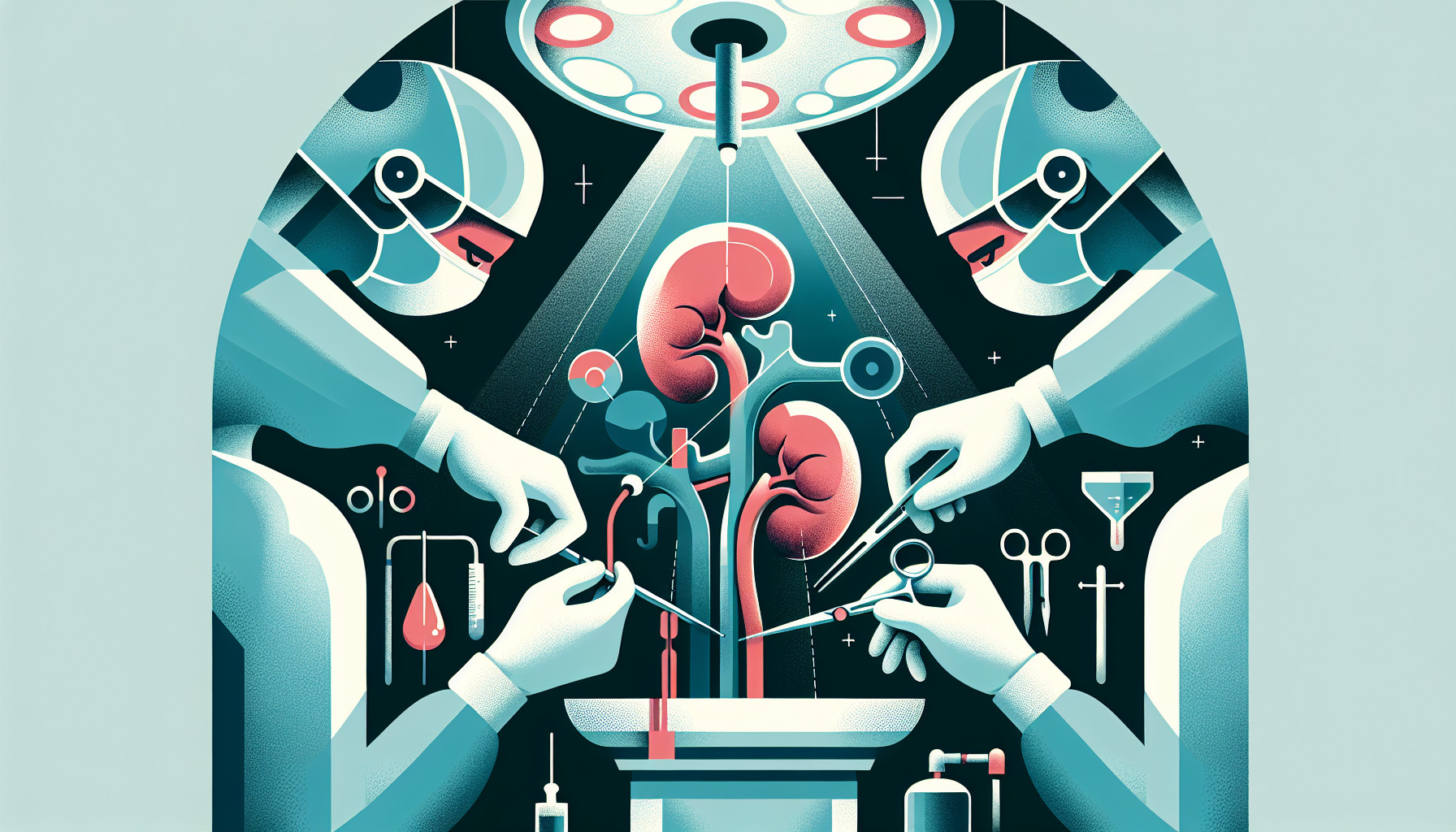Our Summary
The researchers analyzed whether keyhole surgery (laparoscopic nephrectomy or LN) is safer than traditional open surgery (open nephrectomy or ON) for patients with inflammatory kidney conditions. These conditions include xanthogranulomatous pyelonephritis (a rare and serious kidney infection), pyonephrosis (a condition where the kidney fills with pus), and kidney tuberculosis.
The team looked at 16 studies, 13 of which met their criteria, and included 868 adult patients. Of these patients, about 46% had the open surgery, and 54% had the keyhole surgery.
The results showed that keyhole surgery had a 28% lower overall complication rate than the open surgery. It also led to a non-significant reduction in high-grade complications. Patients who had keyhole surgery needed 53% fewer blood transfusions, had less blood loss, and stayed in the hospital for fewer days. However, the keyhole surgery took longer to perform.
In conclusion, keyhole surgery is a safer alternative to traditional open surgery for inflammatory kidney conditions. It has fewer complications, requires a shorter hospital stay, and less blood transfusion, despite taking a bit longer to perform. The expertise of the surgeon and the specific conditions of the patient are important factors in obtaining the best results.
FAQs
- Is laparoscopic nephrectomy (keyhole surgery) safer than traditional open nephrectomy?
- What advantages does laparoscopic nephrectomy have over open nephrectomy for inflammatory kidney conditions?
- Does the time it takes to perform laparoscopic nephrectomy impact its effectiveness or safety?
Doctor’s Tip
A helpful tip a doctor might tell a patient about laparoscopic nephrectomy is to discuss with their surgeon the potential benefits and risks of this minimally invasive procedure compared to traditional open surgery. It is important to understand that while laparoscopic nephrectomy may take longer to perform, it can lead to fewer complications, less blood loss, and a shorter hospital stay. Trusting in the expertise of the surgeon and following post-operative care instructions can help ensure a successful recovery.
Suitable For
Patients who are typically recommended for laparoscopic nephrectomy include those with inflammatory kidney conditions such as xanthogranulomatous pyelonephritis, pyonephrosis, and kidney tuberculosis. These patients may benefit from the lower overall complication rate, reduced need for blood transfusions, less blood loss, and shorter hospital stay associated with laparoscopic nephrectomy compared to traditional open surgery. Surgeon expertise and individual patient factors are important considerations in determining the most appropriate surgical approach.
Timeline
Before laparoscopic nephrectomy:
- Patient is diagnosed with an inflammatory kidney condition such as xanthogranulomatous pyelonephritis, pyonephrosis, or kidney tuberculosis.
- Patient and medical team discuss treatment options, including traditional open surgery or laparoscopic nephrectomy.
- Pre-operative tests and evaluations are conducted to ensure the patient is a suitable candidate for surgery.
- Patient receives information on the procedure, risks, and benefits, and gives consent for surgery.
After laparoscopic nephrectomy:
- Patient undergoes laparoscopic nephrectomy, a minimally invasive surgical procedure where small incisions are made in the abdomen to remove the affected kidney.
- The surgery may take longer than traditional open surgery, but results in less blood loss and a lower overall complication rate.
- Patient requires fewer blood transfusions and has a shorter hospital stay compared to open surgery.
- Patient is monitored post-operatively for any complications and receives appropriate follow-up care.
- Patient experiences a faster recovery time and improved quality of life compared to traditional open surgery.
What to Ask Your Doctor
Some questions a patient should ask their doctor about laparoscopic nephrectomy include:
- Is laparoscopic nephrectomy a suitable option for my specific inflammatory kidney condition?
- What are the potential risks and complications associated with laparoscopic nephrectomy compared to open nephrectomy?
- How experienced are you in performing laparoscopic nephrectomy procedures?
- How long will the laparoscopic nephrectomy procedure take compared to open nephrectomy?
- How long is the recovery time for laparoscopic nephrectomy compared to open nephrectomy?
- Will I need a blood transfusion during or after the laparoscopic nephrectomy procedure?
- What are the potential long-term effects or complications of undergoing laparoscopic nephrectomy?
- Are there any specific lifestyle changes or medications I will need to take after the laparoscopic nephrectomy procedure?
- How frequently will I need follow-up appointments or monitoring after the laparoscopic nephrectomy procedure?
- Are there any alternative treatment options to consider besides laparoscopic nephrectomy for my inflammatory kidney condition?
Reference
Authors: Alsmadi JK, Nofal MN, Alriyalat S, Yousef AJ. Journal: BMC Urol. 2025 Apr 21;25(1):96. doi: 10.1186/s12894-025-01781-z. PMID: 40254599
